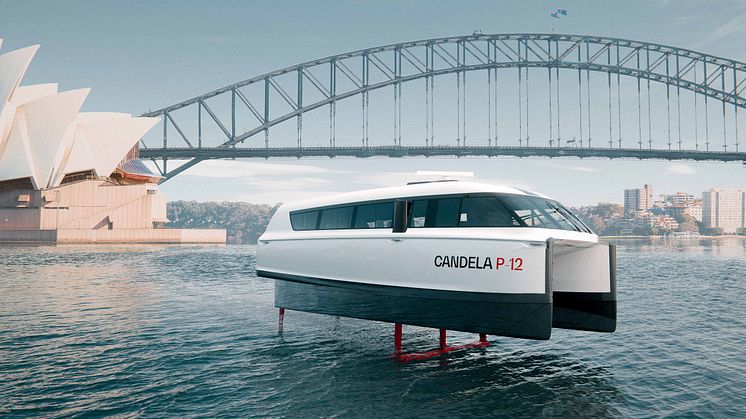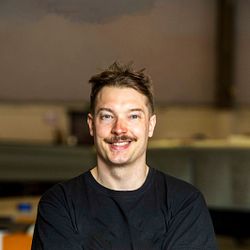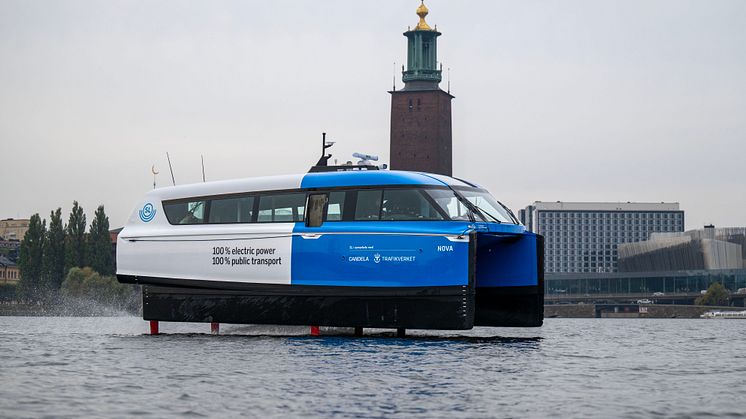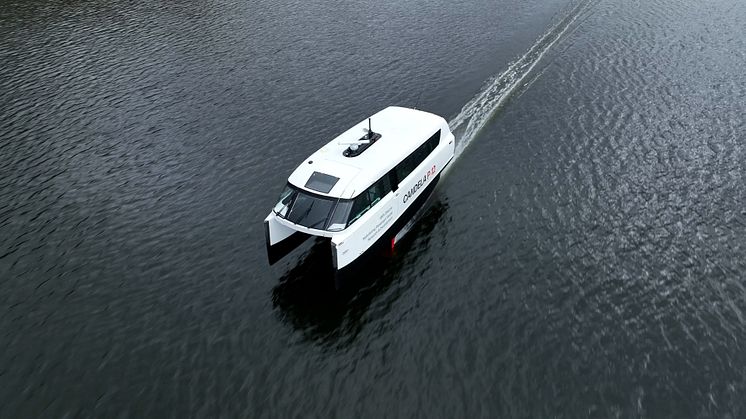
Press release -
Sydney's Next Electric Ferry Can Fly
'Flying’ electric ships could make Sydney’s water transport faster, greener, and far more cost-effective than the diesel ferries currently in use.
Science fiction? Not at all. Swedish tech company Candela is in town to showcase its game-changing hydrofoil vessels—already adopted in several countries.
“If operators overseas and in New Zealand choose foiling vessels, it would be a shame for Sydney to remain stuck with 20th-century technology,” says Gustav Hasselskog, CEO of Candela.
(Media test flights available in Sydney)
Sydney’s iconic ferry system has long been a vital part of the city’s public transport network. However, recent efforts to modernize the fleet have faced significant challenges. The introduction of new ferries with traditional diesel engines falls short of environmental goals, as these vessels continue to emit substantial greenhouse gases. Efforts to replace aging ferries with electric-powered alternatives have also proven difficult, as conventional hull designs consume excessive energy, limiting both range and speed on battery power.
Now, a Swedish company offers a solution: the innovative Candela P-12, the world's first hydrofoil ferry. The P-12 utilizes computer-guided underwater wings, known as hydrofoils, allowing it to ‘fly’ above the water’s surface. This design reduces water resistance, enabling the vessel to achieve cruise speeds of 25 knots while consuming 80% less energy than traditional ferries of the same size. The P-12 can cover distances of 40 nautical miles on a single charge—longer than any other electric ship—making it well-suited for routes across Sydney Harbour. Its capacity to accommodate bicycles and wheelchairs ensures accessibility and convenience for a diverse range of commuters. Moreover, the hydrofoil design minimizes wake generation, preserving shorelines and marine ecosystems.
The P-12’s energy efficiency also addresses one of the greatest challenges in waterborne transport: cost. Being considerably cheaper to operate than even the most efficient diesel vessels, it creates a strong business case for new direct routes and more frequent departures.
No Seasickness
Passengers, on the other hand, enjoy a smooth ride above the waves, free from sea sickness-inducing slamming and pitching. The P-12's digital flight controller continuously adjusts the foils in real time to keep the vessel level, ensuring a comfortable and stable journey even in challenging conditions.
“I’m a firm believer that transition can only happen if the new alternative is better than the old. With the P-12, you make money instead of losing it. In other countries, we’ve seen that repowering conventional vessels with batteries becomes hugely expensive, especially in terms of charging infrastructure,” says Gustav Hasselskog, who is in town to demonstrate the benefits of his vessels.
Video: Candela P-12 foiling in Stockholm's city center
Cutting Commute Times in Half
Candela’s P-12 Shuttle has already demonstrated success in public transport overseas. Operators in countries from New Zealand to the U.S. have purchased the vessel. In Stockholm’s public transport network, the first P-12 line was launched in October 2024, offering a 30-minute commute from the suburb of Ekerö to the city center—effectively halving the travel time compared to traditional diesel ferries. The flying ship received an exemption from speed limits as it does not create harmful wake. This service has been well received, with every departure fully booked, and has cut CO₂ emissions per passenger kilometer by an impressive 95%.
Notably, the P-12 line in Stockholm is operated by Transdev, the same company that runs Sydney’s ferries.
“We think Sydney deserves faster, more sustainable, and more cost-effective waterborne transport. Once you try electric hydrofoiling, it’s an eye-opener, says Gustav Hasselskog.
Candela will now demonstrate the benefits of its foiling technology for members of the press—on the water during the Sydney Harbour Concours d'Élégance (February 28–March 2) and on land during the Everything Electric Show (March 7–9).
Candela is represented in Australia by Carbon yachts.
Press trials of Candela's demo vessel are available upon request.
For media inquiries about test rides and interviews with Gustav Hasselskog, contact Mikael Mahlberg at mikael.mahlberg@candela.com.
Related links
Stockholm-based Candela Technology AB is the world leader in hydrofoiling electric vessels. The company was founded in 2014 by engineer and business leader Gustav Hasselskog with the mission to accelerate the world's transition to fossil fuel-free lakes and oceans by developing electric vessels that outperform those powered by fossil fuels.
Candela's watercraft have wings (hydrofoils) that lift the hull above the water and reduce friction, using 80% less energy than conventional ships at high speed. This technology allows for long-range water travel solely on battery power, a first in the industry. Candela's hydrofoils also enable operators to transition to sustainable fleets by providing up to 50% lower operational costs.
At the heart of Candela's hydrofoil tech stack is the Flight controller, which automatically stabilizes the vessel during flight by regulating the foils, using sensors that gauge wave height and wind speed, among other factors. Even in rough weather, passengers experience 90% less g-forces than they would on a traditional boat. All Candela vessels are fully connected and receive over-the-air updates.
After five years of research and development, Candela began producing the world's first electric hydrofoil leisure boat in 2019, the Candela C-7 open "roadster of the seas". This was followed in 2022 by the high-volume market Candela C-8, which was delivered to the first customers in spring 2023. Over 150 C-8 units have been sold to date, and the vessel has been lauded as a "game changer" by Motorboat and Yachting magazine, winning numerous awards including the 2022 European Powerboat of the Year award for its superior seakeeping, long range, and high speed.
In 2023, Candela launched its first commercial vessel, the Candela P-12 Shuttle ferry. It is the fastest and longest-range electric ship ever built, with a top speed of 30 knots and a range of 40 nautical miles at 25 knots. It is also the most energy-efficient fast ship ever made in its size class. Substantial operational cost savings are expected. The first unit enters service in Stockholm's public transport system in 2024.
Candela is a technology company with headquarters in Stockholm, Sweden, employing over 200 engineers, technicians, and production staff. The company develops the entire tech stack, from the C-POD motor to the control system and carbon fiber hulls, in-house. Candela's two wholly-owned factories in Stockholm, Sweden, produce the Candela C-8 and P-12 vessels. The company also has leisure boat resellers in 12 countries and wholly-owned sales offices in San Francisco, USA, and Cannes, France.




